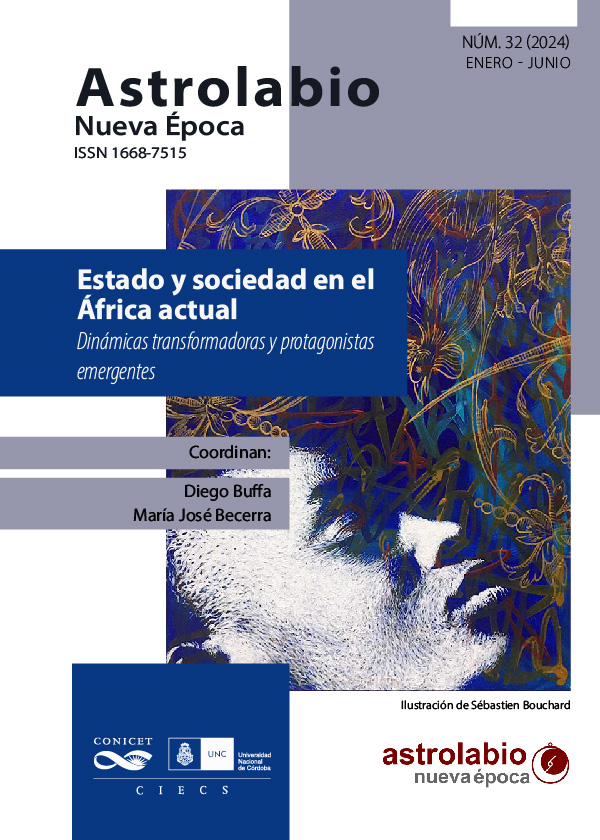Time and Gender as Determinants of Poverty: An Analysis for the Province of Santa Fe, Argentina, in 2013
Main Article Content
Abstract
This paper aims to calculate time poverty in the province of Santa Fe in the third quarter of 2013 based on the INDEC survey on unpaid work and time use, by means of the quantitative methodology proposed by Zacharías, Antonopoulos and Masterson (2012). Its specific objectives are, firstly, to estimate individual time poverty; secondly, to calculate time poverty according to the demographic structure of households and; thirdly, to analyze the results based on how paid and unpaid work is distributed according to sex. Among the paper’s results, it was found that women aged 18 or over spend more time than men on unpaid domestic and care work, while the opposite occurred with paid work. Regarding time poverty, it was observed that 20.2% of people aged 18 or over in the province of Santa Fe were time poor, 75.7% of which were women. Moreover, 40.4% of the households surveyed were time poor. Finally, it was found that of all the people aged 17 or younger in the province of Santa Fe, 80.6% belonged to a time poor household.
Downloads
Article Details

This work is licensed under a Creative Commons Attribution-NonCommercial-ShareAlike 4.0 International License.
Astrolabio, Nueva Época está protegida bajo licencia Licencia Creative Commons Atribución-NoComercial-CompartirIgual 4.0 Internacional. La propiedad intelectual de los artículos pertenece a los autores y los derechos de edición y publicación a la revista. Los artículos publicados podrán ser usados libremente para propósitos científicos y académicos, siempre y cuando se realice una correcta citación de los mismos. Cualquier persona física o jurídica que desee reimprimir parte o la totalidad de algún artículo, deberá obtener permiso escrito de los editores de Astrolabio Nueva Época, quien lo otorgará con el consentimiento del autor.
References
ANDREOZZI, Lucía; GANEM, Javier E.; GELI, Miriam; GIUSTINIANI, Patricia S.; y PEINADO, G. (2018). “Pobreza por ingreso y tiempo en la ciudad de Rosario”. Astrolabio – Nueva Época, 20, 213-232. Disponible en: https://revistas.unc.edu.ar/index.php/astrolabio/article/view/17780 [consulta: 23 de febrero de 2022].
ANDREOZZI, Lucía; GANEM, Javier E.; GELI, Miriam; GIUSTINIANI, Patricia S.; y PEINADO, G. (2021). “Género y pobreza de tiempo en la ciudad de Rosario, Argentina”. Investigaciones Feministas,12-2, 559-574.
ANTONOPOULOS, Rania; ESQUIVEL, Valeria; MASTERSON, Thomas; y ZACHARÍAS, Ajit. (2016). Measuring Poverty in the Case of Buenos Aires: Why Time Deficits Matter. Annandale-on-Hudson, NY: Levy Economics Institute of Bard College. Disponible en: http://www.levyinstitute.org/pubs/wp_865.pdf [consulta: 23 de febrero de 2022].
BARDASI, Elena y WODON, Quentin. (2006). Measuring time poverty and analyzing its determinants: concepts and application to Guinea. En Quentin Wodon y Mark Blackden, Gender, time use, and poverty in Sub-Saharan Africa, pp. 75-95. Washington, DC: The World Bank.
BUDLENDER, Debbie. (2008). The statistical evidence on care and non-care work across six countries. Geneva: United Nations Research Institute for Social Development.
CALERO, Analía (2018). “Pobreza de tiempo e ingresos: mediciones y determinantes para la Argentina”. Actualidad Económica, 96, 15-42.
D’ALESSANDRO, Mercedes. (2016). Economía feminista: Cómo construir una sociedad igualitaria (sin perder el glamour). Buenos Aires: Sudamericana.
ESQUIVEL, Valeria. (2009). Uso del tiempo en la ciudad de Buenos Aires. Los Polvorines, Buenos Aires: Universidad Nacional de General Sarmiento.
ESQUIVEL, Valeria. (2014). La pobreza de Ingreso y tiempo en Buenos Aires, Argentina. Un ejercicio de medición de la pobreza para el diseño de políticas públicas. Panamá: Programa de las Naciones Unidas para el Desarrollo.
FERES, Juan Carlos y MANCERO, Xavier. (2001). Enfoques para la medición de la pobreza. Breve revisión de la literatura. Santiago de Chile: CEPAL.
INDEC (Instituto Nacional de Estadística y Censos). (2011). Encuesta anual de hogares urbanos. Diseño de registro y estructura para las bases de microdatos individual y hogar. Buenos Aires: Autor. Disponible en: https://www.indec.gob.ar/ftp/cuadros/menusuperior/eahu/EAHU_disenoreg.pdf [consulta: 23 de febrero de 2022].
INDEC (Instituto Nacional de Estadística y Censos). (2013). Encuesta sobre trabajo no remunerado y uso del tiempo. Informe técnico. Diseño de registro y estructura de la base de microdatos. Buenos Aires: Autor. Disponible en: https://www.indec.gob.ar/ftp/cuadros/menusuperior/tnr/TNR_disenoreg.pdf [consulta: 23 de febrero de 2022].
INDEC (Instituto Nacional de Estadística y Censos). (2020). Hacia la encuesta nacional sobre uso del tiempo y trabajo no remunerado. Buenos Aires: Autor. Disponible en: https://www.indec.gob.ar/ftp/cuadros/sociedad/documento_trabajo_enut.pdf [consulta: 23 de febrero de 2022].
MARCO NAVARRO, Flavia. (2013). La utilización de las encuestas de uso del tiempo en las políticas públicas. En Coral Calderón Magaña (coord.), Redistribuir el cuidado. El desafío de las políticas, pp. 171-204. Santiago de Chile: CEPAL.
PAZ, Jorge. (2019). La pobreza en la Argentina. Explorando más allá de los ingresos y más allá de los promedios (incidencia, composición y evolución 2004-2019). Salta: IELDE.
RODRÍGUEZ ENRÍQUEZ, Corina. (2014). El trabajo de cuidado no remunerado en Argentina: un análisis desde la evidencia del Módulo de Trabajo no Remunerado. Buenos Aires: ELA. Disponible en: https://ri.conicet.gov.ar/bitstream/handle/11336/34802/CONICET_Digital_Nro.0d0828bc-d5d1-455c-9b1d-59cdd40cb35d_A.pdf?sequence=2&isAllowed=y [consulta: 23 de febrero de 2022].
ROWNTREE, Seebohm. (1902). Poverty. A Study of Town Life. London: Thomas Nelson and Sons.
SEN, Amartya. (1985). “Well-being, Agency and Freedom. The Dewey Lectures 1984”. The Journal of Philosophy, 82-4, 169-221.
SERAFINI, Verónica y FOIS, Montserrat. (2021). Mujeres, deuda y desigualdades de género. Lima: Latindadd.
SMITH, Adam. (1994). La riqueza de las naciones. Madrid: Alianza. (Edición original, 1776.)
TOWNSEND, Peter. (1979). Poverty in the United Kingdom. London: Allen Lane and Penguin Books.
VICKERY, Clair. (1977). “The Time-Poor: A New Look at Poverty”. The Journal of Human Resources, 12-1, 27-48.
ZACHARÍAS, Ajit; ANTONOPOULOS, Rania; y MASTERSON, Thomas. (2012). “Time Deficits and the Measurement of Income Poverty: Methodology and Evidence from Latin America”. Ponencia presentada en la 32nd General Conference of the International Association for Research in Income and Wealth. Boston, 5 al 11 de agosto.

